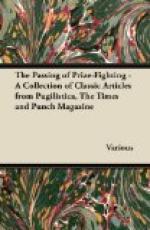* * * * *
You will hardly have traversed the passages of our underground railway system without being hurriedly aware in passing of a picture in reds and browns, representing a faun-like figure piping to an audience of three rather self-conscious rabbits. This pleasing group does not portray an actual scene from Autumn (LANE), but is rather to be taken as symbolic of the atmosphere of Miss MURIEL HINE’S latest book. The faun, I imagine, stands for Rollo, the middle-aged lover of the country, into whose happy life other, more human, loves break with such devastation. What the rabbits mean is a more difficult problem. I jest; but as a matter of fact I should be the first to admit that Miss HINE has written a story that, despite a certain crudity of colouring, is both unconventional and alive. The attitude of the characters towards their parents, for example, is at least original. Deirdre, the heroine, frankly despised her mother, to whom she owed a marriage with the man whom she hated. The gift of a country cottage enabled her to escape from him to rabbits (figurative) and the simpler life. There, however, she fell in with Rollo, who loved her at sight, and whose daughter, Hyacinth, adored her father, but quite blandly deceived him about her own amorous adventures. A pretty tangle, you observe, and I am not sure that I can wholly acquit the author of some cowardice in her manner of cutting it. But undoubtedly Autumn remains a story to read, and remember.
* * * * *
Since Mr. H. PERRY ROBINSON’S name must be familiar to most of us by now as that of one of the very select company of journalists who monopolise seats at the Front, one naturally turns with interest from his daily despatches to a sustained narrative. His account of last year’s battle of the Somme, which he names The Turning Point (HEINEMANN), is as lively and vigorous a recital as can well be imagined of events hardly the less thrilling because already well-known. Although he disclaims expert knowledge of strategies, he is at least uncommonly well qualified to appraise the things he saw. “Before July, 1916, our Army,” he says, “was like a small hoy hoping to grow up and be big enough to lick a bully some day. Told to attack him before he felt sure of his own strength, the small boy would not have been sorry to wait a bit longer, but the pressure against Verdun and against the Russians had to be relieved, and so with steadily




